Occupational Licensing Roundup #1
post by Zvi · 2024-10-30T11:00:04.516Z · LW · GW · 11 commentsContents
Campaign Talk Universal Effects and Recognition Construction Doctors and Nurses Florists Fortune Telling Hair Lawyers Magicians Military Spouses Mountain Climbing Music Nurses Physical Therapists Whatever Could Be Causing All This Rent Seeking Tornado Relief Volunteer Tree-Trimmer Fined $275, Told to Leave Minneapolis, After Helping Tornado Victims Outside His Assigned Area Pretty Much Everything None 11 comments
We’re coming out firmly against it.
Our attitude:
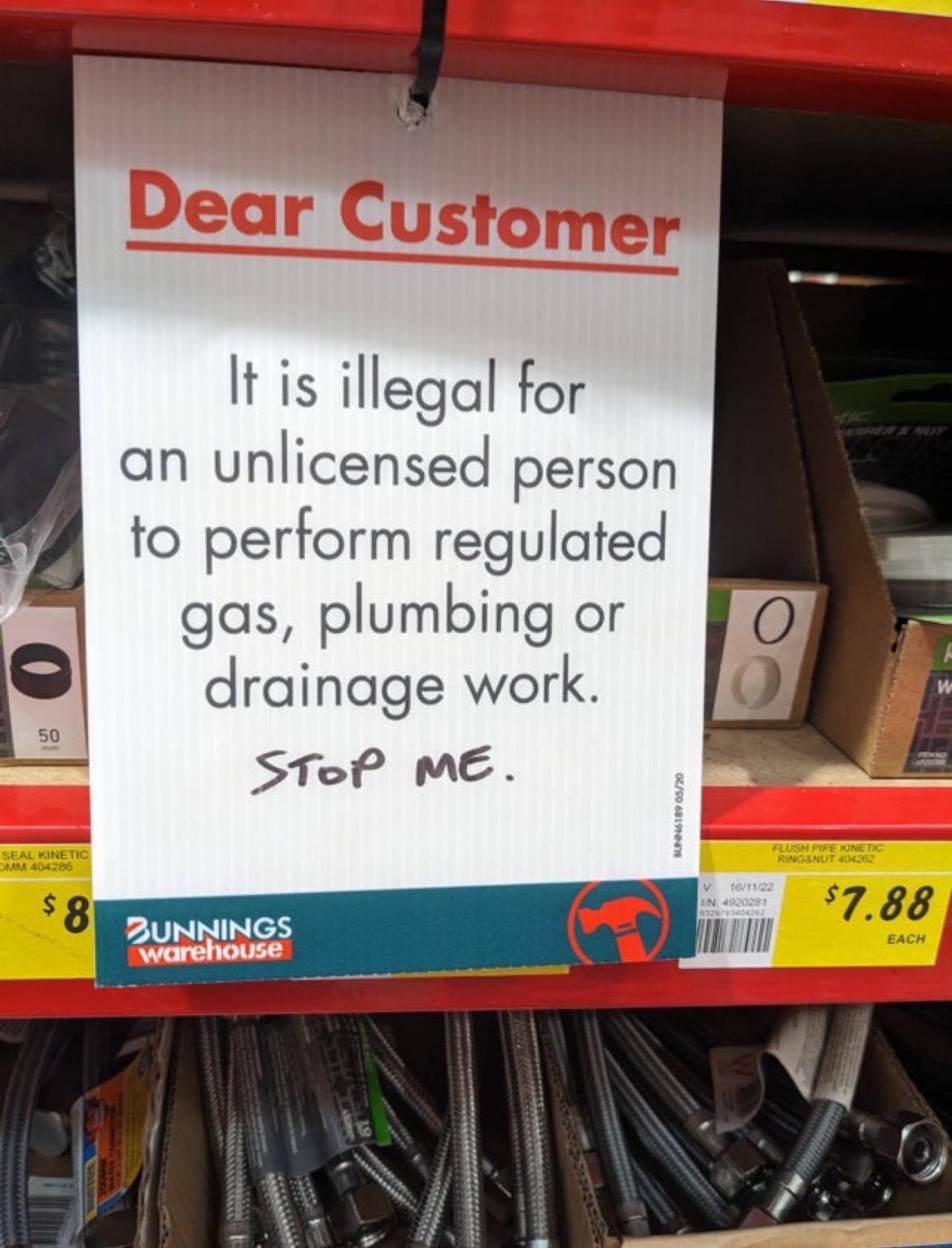
The customer is always right. Yes, you should go ahead and fix your own damn pipes if you know how to do that, and ignore anyone who tries to tell you different. And if you don’t know how to do it, well, it’s at your own risk.
With notably rare exceptions, it should be the same for everything else.
I’ve been collecting these for a while. It’s time.
Campaign Talk
Harris-Walz platform includes a little occupational licensing reform, as a treat.
Universal Effects and Recognition
Ohio’s ‘universal licensing’ law has a big time innovation, which is that work experience outside the state actually exists and can be used to get a license (WSJ).
Occupational licensing decreases the number of Black men in licensed professions by up to 19%, and the number of Black women up to 22%. There is also the headline finding, which is that overall labor supply is reduced 17%-27%. Hopefully this can defeat some talking points or get through some of the damage being done.
Erica Jedynak: 26 states have joined the movement of significant occupational licensing reform – removing government barriers so more Americans can land their dream job. To all the allies part of the original OL coalition, thank you!
Knee Regulatory Research Center: Universal licensing recognition is a growing labor market reform for an easier transition of occupation licenses to new states. A new report from the Knee Center shows 26 states have passed universal recognition policies since 2013. Read more here.
This is really great, everyone needs to get on this to the maximum extent possible.
Libby Jamison: Lots of support for license portability! “About 83% of 848 registered voters surveyed nationwide said they support rules that allow the use of the licenses wherever military family members may move in the U.S.”
The obvious follow up is indeed ‘why only military’? License portability should be universal.
25% of Colorado jobs require a government license. They are at least opening up those jobs to some of the people with criminal records after three years via House Bill 1004. Better yet, we could scrap the requirements entirely.
Podcast on Utah’s approach to occupational licensing reform, based on requiring reviews. I am curious how much this ends up improving things.
To avoid a publication bias style problem I will note I am unconvinced by the paper from Blair and Fisher that notes Angi lead acceptance rates are 21% lower in the presence of occupational licensing requirements, which they attribute to lack of available supply. The problem is that this could be a reflection of things such as lower quality, where low quality providers accept leads a lot while high quality ones can afford to pick and choose. Thus, while I am in general highly convinced such requirements are counterproductive, I don’t think this provides strong additional evidence of that.
I like this new framing from The Atlantic, calling occupational licensing ‘permission slip culture.’
Construction
Connecticut requires occupational licensing to work ‘in the trades’ such as construction, which is leading to a worker shortage.
Doctors and Nurses
Doctors from abroad permitted to practice in Tennessee starting 2025, other states following suit. Yes, this is the right thing to do given a shortage, also without a shortage. Presumably this will form a natural experiment that shows it goes great, and the AMA will fight with all its might to stop it from spreading.
This seems pretty great:
Scott Lincicome: New paper: State laws granting nurse practitioners full practice authority (FPA) “reduces total health care costs for diabetics by approximately 20% in urban areas and reduces rural usage of advanced medical services for diabetics by about 10%.”
That is one of those effect sizes so big it is suspicious. Hot damn.
Florists
We won a local victory on this one.
Shoshana Weissman: HOLY SHIT IT FINALLY HAPPENED TELL THE OTHERS
No more florist licensing in Louisiana!
I’m gonna have to make an example out of some other state!
The origins of reform have a really horrible story.
Elderly widow Sandy Meadows died in poverty because the government wouldn’t let her be a florist.
After Meadows’ husband passed away, she had little money or education. She found a way to support herself by managing the floral department of a local grocery — until Louisiana Horticulture Commission threatened to shut down it down unless it hired a licensed florist.
The exam required they arrange 4 bouquets in 4 hours. The results were judged by a panel of licensed Louisiana florists, who obv viewed applicants as competitors. The passage rates for the exam were below 50%; even longtime florists often failed it.
“One licensed florist in the state described the test as nothing more than a “hazing process.” Ultimately, because she could not pass the exam, the grocery store had to let Meadows go.”
You have to admire the chutzpah of such groups. Well, no you don’t, but you should.
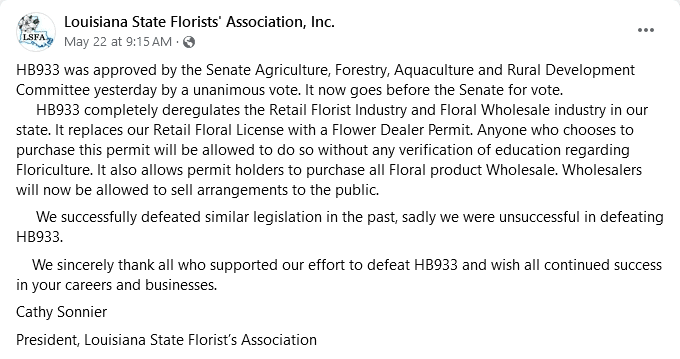
Chris Retford: Someone should send them flowers.
Clark Neily: If you follow me or have read my book, Terms of Engagement, you may think I heap excessive scorn on the rational basis test. But I assure you that’s metaphysically impossible—as this excerpt from the DCT opinion *upholding* the florist-licensing law shows.
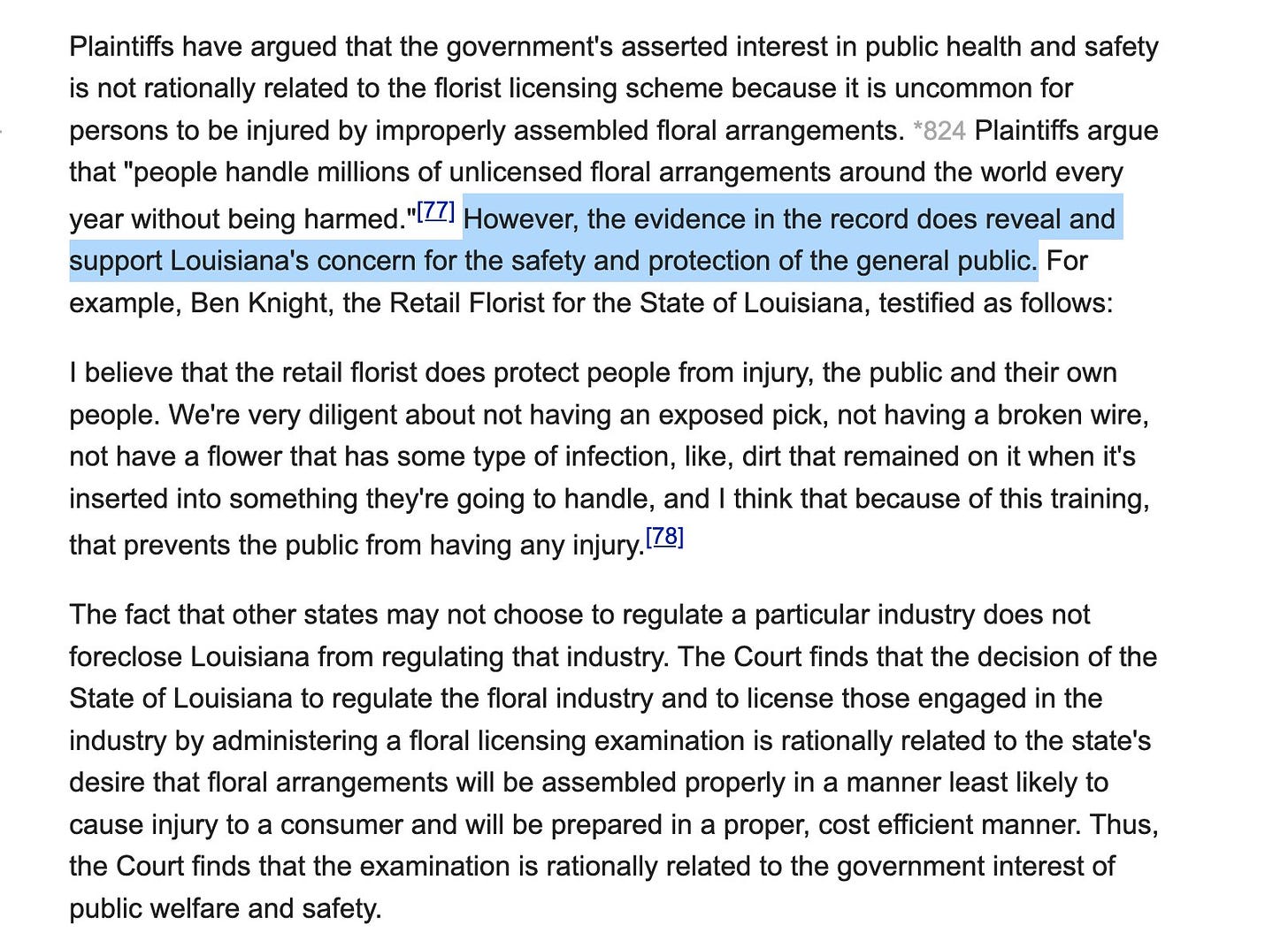
Seriously, burn it all to the ground. No occupational licenses for anything. Nuke from orbit. Only way to be sure. Replace with insurance requirements where it feels necessary. If we make a handful of mistakes that way? Well, that is a price I am willing to pay.
Fortune Telling
Pennsylvania (unexpectedly?) outlaws fortune telling.
The incident also drew attention to the fact that despite its widespread popularity, fortune-telling and related arts are indeed illegal in Pennsylvania, punishable by 6-12 months in jail and a $2,500 fine. Pennsylvania statute forbids residents from “pretend[ing] for gain or lucre, to tell fortunes or predict future events, by cards, tokens, the inspection of the head or hands of any person,” and from promising “to stop bad luck, or to give good luck … or to win the affection of a person, or to make one person marry another.”
Selling astrology readings and tarot readings are illegal, too.
The standard defense is to say the readings are ‘for entertainment purposes only.’
Except, no. They’re not.
There is a strong argument for the level of enforcement we see described here. The whole thing is centrally a fraud. Most of the time it is a harmless and fun one that many people get something out of. There are also ways to use the tools responsibly. You can get real utility, as I have, out of a tarot reading by using it to figure out what you really think and explore possibilities. Cold reading can allow the providing of useful advice, and is a fun game. Magick is not what its proponents claim to outsiders, but it is less fake than most people reading this think.
However, this goes hand in hand with actually malicious fraud, as the way (at least) many fortune-tellers and other such folks make most of their money is to sell high priced services to vulnerable victims who they very much defraud and prey upon.
So the idea is that when that happens, and it comes to the authorities’ attention, they can reliably crack down without having a high burden of proof. If no one complains, everything is fine, police have better things to do.
Therefore customers hold the balance of power, and have to be treated well. Not the first best solution to the problem, but it mostly works.
Hair
By default you get things like this, and they say it like they are proud of it.
Governor Ned Lamont (D-Connecticut): By requiring inclusive hair education for cosmetology licenses, we can ensure that all hair types and textures are properly cared for. This law supports our diverse communities and sets a new standard for excellence in beauty services. I’m proud Connecticut is leading the way.
St. Louis has signed a bill legalizing cutting hair after 6:30pm. Good for St. Louis, but that just raises further questions.
Olivia French in DC, who was appointed by Mayor Bowser, has been ‘selling cosmetology and barber licenses to unqualified students for thousands of dollars.’
Four notes.
- ‘Unqualified’ students? That’s not a thing, this is hair.
- Good.
- This is an estimate of how much value is lost when we require these courses.
- If you elect a Mayor Bowser, I don’t really know what you were expecting.
Do people believe in the need for all this nonsense?
Yes. They really, really do. Not all of them, but a remarkable fraction of them.
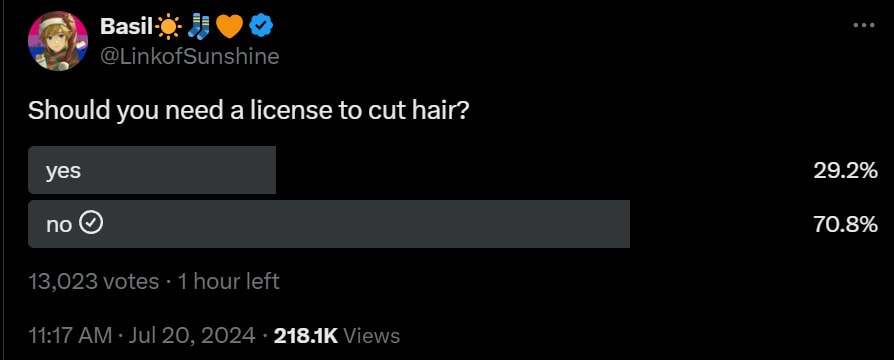
It was up at 40% earlier, before it was circulating in different circles.
Emmett Shear: The replies to this thread blow my mind. People legit believe the state needs to protect them from bad haircuts by ensuring hair stylists meet training standards. I’ve never seen the nanny-state mind virus (timorus overprotectionis) on clearer display.
Here are the top 4 comments in order:
Capybara Enjoyer: I don’t understand why barbers are always the first criticism of occupational licensing, there’s a lot of potential chemical and hygiene issues in the job. Some states might overdo it, but i don’t get why this is a job used to highlight why licensing is bad. Infections are risky.
Jon Swifty: My girlfriend tried cutting my hair once and I called the cops on her. Gotta stay safe, I almost experienced something without the explicit consent of the government.
Andrew Works: Seeing as it could impact one’s life (such as looking unprofessional during a job interview, I say yes.
Jake Thompson: Yes, but only if you are giving shaves. I am of the opinion that barbering needs a license because like you could literally kill someone. We need to prevent more Sweeney Todd situations.
The reason to require a license is if reputational effects don’t work…
Among the Wildflowers: There is NO reason we should require cosmetologists to have a license.
Trust me – if someone fucks up a woman’s haircut, everyone within a ten-mile radius will know about it. We don’t need a license to prove we can cut hair.
CUT IT OUT.
Alas, instead, Michigan is going to make things even worse.

It seems that there is a federal rule that to get financial aid for your unnecessary occupational licensing training, the hours of training from the program have to match the required hours. That’s an obvious sign that no one cares about actually teaching things – too few hours is illegal, and also too many is almost de facto illegal too. So the schools involved that were training for ‘too many’ hours threw a fit, and lawmakers caved, increasing the requirements to match, a pure case of That Which Is Not Forbidden is Compulsory, and That Which Is Not Compulsory is Forbidden.
Needless to say, none of this makes any sense whatsoever. 600 hours to become a Manicurist? What? New York requires 250, even that seems utterly crazy. I don’t even know what the theory of something going wrong is, beyond ‘our wages might fall.’
Lawyers
It is bold to write the case that The World Needs More Lawyers. Given what I keep paying when I need lawyers in order to safely do regular business, one could make a case. What we need is not more lawyers. We need more ability to do legal work.
One way to do that is more lawyers. The post has better suggestions.
Another strategy is to let lawyers more easily move jurisdictions, or change the requirements to eliminate counterproductive requirements, such as those that discourage seeking professional help with mental health and pointless-in-practice CLE requirements. Another is to open up more of the basic work to other trained professionals (or where feasible AIs and other computer programs).
Another is allowing non-lawyers to own legal service companies, which Arizona has experimented with thanks to a court ruling, with good results. We have a lot of knobs we could turn, if the lawyers who run our government wanted the price of legal services to go down rather than go up.
Four states have stopped requiring the bar exam to practice law. This is being reported as a DEI-run-rampant story, whereas it is actually a DEI-allows-sanity story. Yes, obviously the bar exam like all licensing requirements is an ‘unnecessary block’ to Black individuals becoming attorneys, because it is such a block for all people looking to become attorneys.
Is it ‘disproportionate’? I don’t care. What matters are results, not rhetoric. I am totally fine with using ‘unnecessary regulation X is bad for group Y’ as a reason to get rid of unnecessary regulation X that is bad for everyone. More of this, please.
Magicians
Let’s see them get out of this one.
Shoshana Weissmann: Someone asked me
I can’t believe this exists
OCCUPATIONAL LICENSING FOR MAGICIANS
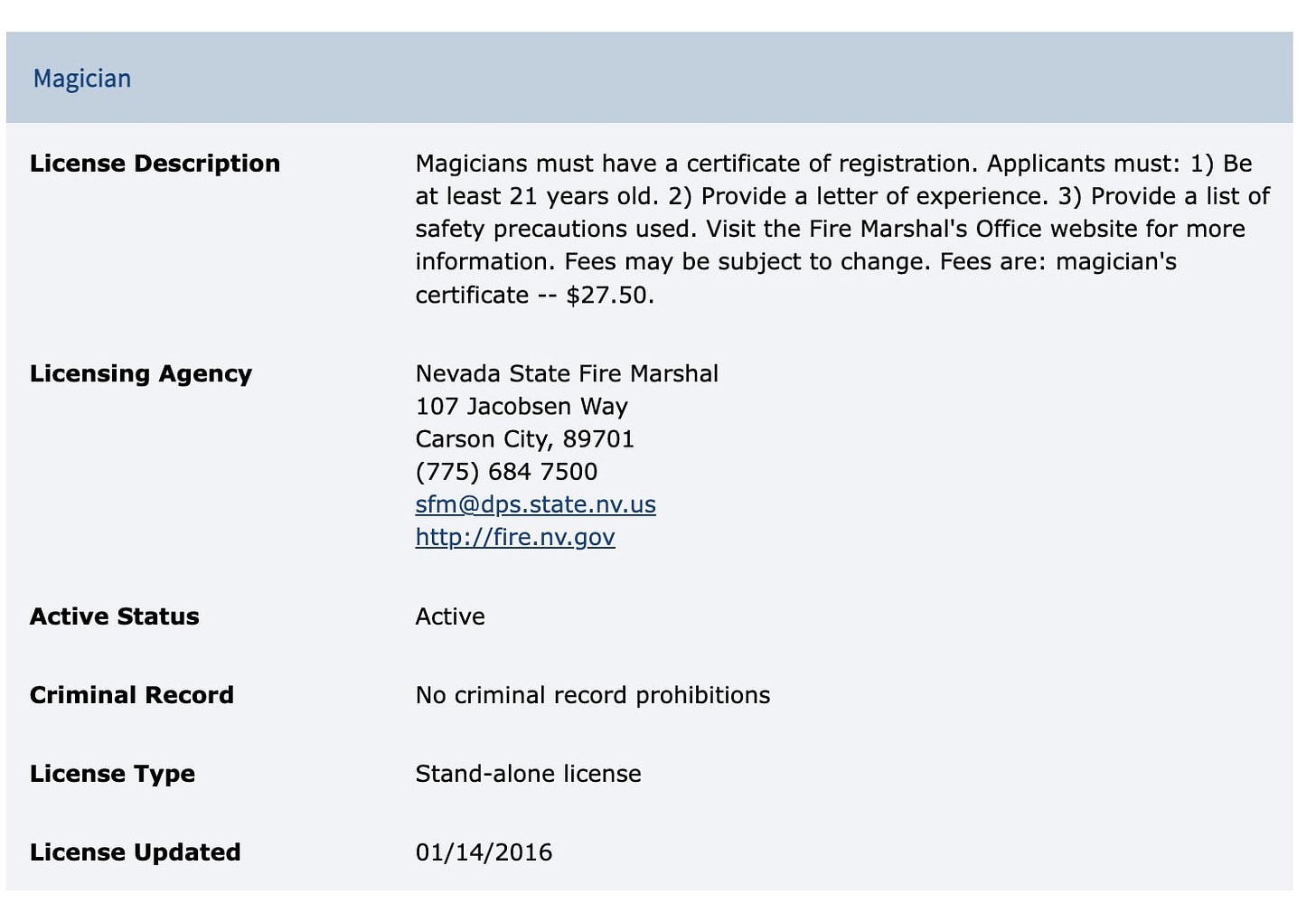
Military Spouses
Colorado signs bill for licensing recognition for military spouses, making it easy to get their out-of-state credentials respected. The obvious question is why not do this for everyone, but I’ll take it.
It works. Full recognition of military spouse licenses for registered nurses increases the probability of employment mobility by around 12%, while more restrictive reforms have the opposite effect. Obviously if you make licenses more portable employment will be more portable. The effect size being large is worth confirming though. The question is, what about all those dastardly nurses who are truly qualified to work in Ohio but not in Arkansas, or vice versa?
Mountain Climbing
Shoshana Weissmann: So this is my new enemy I guess.
AP: The youngest woman to climb all of the world’s 14 tallest peaks calls for novices to be regulated.
A British mountaineer who set the record as the youngest female to climb all the 14 tallest mountains in the world said Thursday that inexperienced climbers should not be allowed to climb the highest peaks because they run the risk of endangering their lives and others.
This isn’t an unusually crazy or stupid proposal. The other occupational licenses that actually exist are often exactly this crazy or stypid.
Music
I… think… this is real? A law introduced in Kentucky to license music therapists? As in, people who play recorded music?
Nurses
Preston Cooper: All on board with banning legacy admissions but TBH this probably would have been the more consequential California higher ed policy change.
Quick hits: Newsom vetoed two bills that would have allowed some community colleges to offer bachelor’s degrees in nursing, a contentious idea in the state’s rigid higher-ed system despite nursing shortages.
Preston Cooper: “The California State University opposes both bills, viewing them as undermining a promise lawmakers made two years ago that community colleges wouldn’t issue bachelor’s degrees that duplicate existing Cal State programs.”
Cartels gonna cartel.
Cal Matters: Update: On Sept. 27, Gov. Gavin Newsom announced he had vetoed both bills. In his veto messages, Newsom urged community colleges to work with colleges and universities that already issue bachelor’s degrees in nursing programs. He said he worried that these bills to allow community colleges to award their own bachelor’s degrees in nursing would undermine those existing partnerships.
He also noted that the state has recently given both community colleges and the California State University more freedom to create new degree programs and that “a pause should be taken to understand their full impact before additional authorities are granted.”
Quote that the next time someone says you should take Newsom’s veto explanations as words that have meaning.
Physical Therapists
New York is going to require physical therapists to hold doctorates (60 more credits than previously required). The reasons given are only slightly paraphrased when I summarize them as ‘rent seeking.’ The insiders told us to restrict market entry.
Whatever Could Be Causing All This Rent Seeking
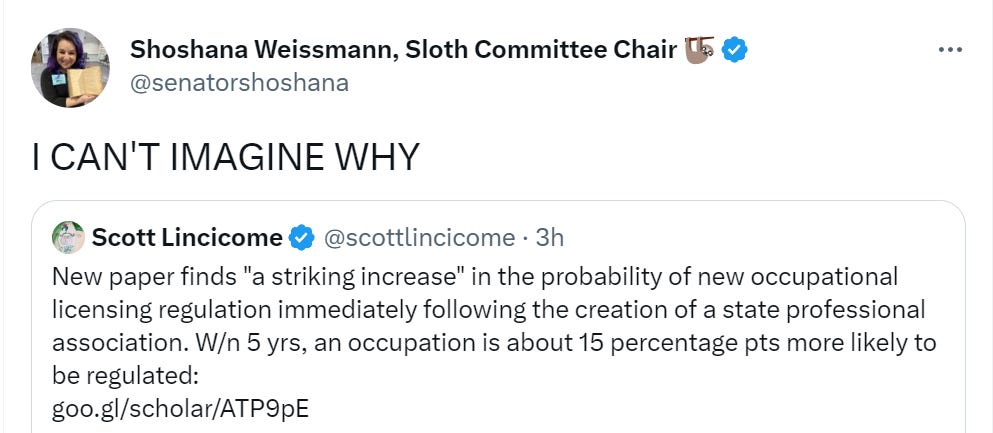
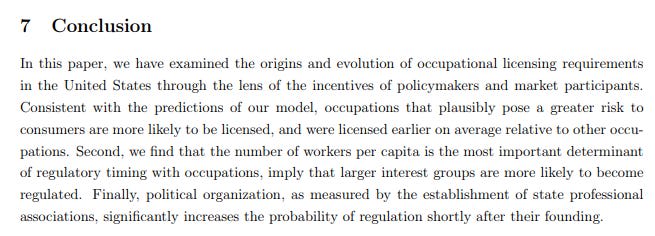
Masks off, how do you do, fellow rent seekers:
Shoshana Weissmann: Actual inbox from someone who runs license testing in FL: “There is nothing wrong keeping people from other states from stealing construction business from already established, licensed and insured Florida contractors.”
YIKES.
Well, then.
Adam Morris: After Harvey, there were people whose houses weren’t fixed for 2-3 years in part because there weren’t enough contractors available to handle all the work.
After a hurricane, “not enough work for local contractors to do” is not the problem.
Tornado Relief
Volunteer Tree-Trimmer Fined $275, Told to Leave Minneapolis, After Helping Tornado Victims Outside His Assigned Area
Even if we are not going to fix occupational licensing in general we should do it in emergency situations via permanent known rules that get triggered when there is a hurricane or other similar event.
Pretty Much Everything
Legal Style Blog: The list of businesses which require a licence in Los Angeles County is hilariously specific. Bookstores, rifle ranges, ambulettes, hog ranches, taxi dancers (are there any in 2024?), peddlers, bottlewashing, raw horsemeat…
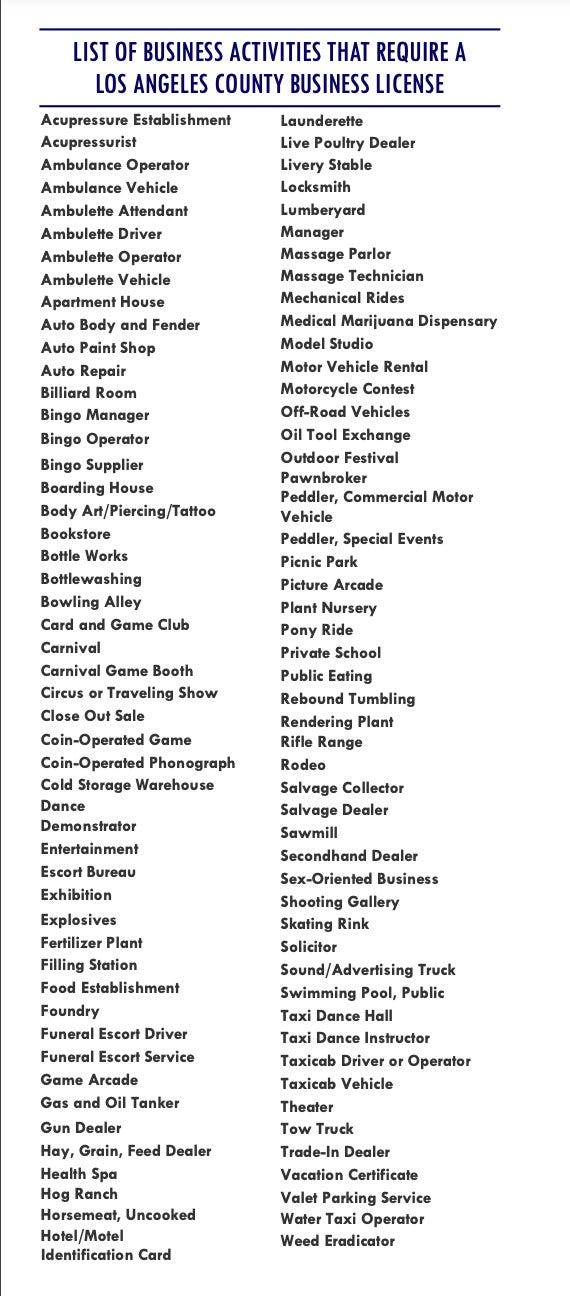
11 comments
Comments sorted by top scores.
comment by Phil Scadden (phil-scadden) · 2024-10-30T20:51:24.205Z · LW(p) · GW(p)
While I agree that the examples are stupid, I am not so sure about the electrical and plumbing. Connecting things to a public water supply that result in contamination from backflow/siphoning is very bad. You also dont want to electrocute a power pole worker who thinks power is off, but your house with DYO solar connection suddenly starts exporting power to grid. If I was insurer, I would take a dim view of unregister plumbing or electricial work in your house because of fire and flood risk. Where I live, so long as you are owner of property , you can do electricial that doesnt involve swithboard or cables coming into switchboard from street. Fair compromise? Drainlaying rules are still extremely strict though.
Replies from: AnthonyC↑ comment by AnthonyC · 2024-11-06T12:50:25.896Z · LW(p) · GW(p)
I think the things we need in those scenarios are permits and inspections before completing the connection/installation of the new stuff, which I have always needed in any state I've lived in in addition to needing to use licensed plumbers and electricians.
comment by Templarrr (templarrr) · 2024-10-31T09:49:55.066Z · LW(p) · GW(p)
Two things to note.
First - I feel like putting every occupation in the same pile and deciding are you for or against licensing isn't helpful? I personally don't need licensed lawnmower, but I would very much prefer licensed doctor. The cost of mistake in two occupations differs a lot and can be used for a threshold which jobs should require a license.
Second - there should be a difference between doing a thing to yourself (argument can be made even that here we shouldn't have any limits), doing things for free to your friends/relatives with their full knowledge of your skill level and experience (most of the non life-threatening things can probably be allowed here) and selling your craft for money.
Replies from: AnthonyC↑ comment by AnthonyC · 2024-10-31T12:31:29.457Z · LW(p) · GW(p)
I get the same instinct, but on reflection I don't endorse it. How much work in ensuring doctor quality is state-level required licensing actually accomplishing, as opposed to medical school graduation, residency completion, malpractice insurance premiums, employers (for anyone who doesn't run their own practice), and legal action (including lawsuits as well as criminal negligence and similar charges)? For whatever part may be additional and due to licensing, how does that stack up against the effects of restricting the supply of doctors, increasing the price of medical care, and reducing the ability of patients to receive telemedical care or consultations from experts or specialists who happen to be in another state?
Even if there is a licensing regime of some sort, I think there should be automatic reciprocity among all US states and territories, and between the US and a list of other countries with reasonably comparable or better standards. Same logic should be applied to drug and medical device approvals.
comment by AnthonyC · 2024-10-30T14:17:57.125Z · LW(p) · GW(p)
The obvious follow up is indeed ‘why only military’? License portability should be universal.
I assume the short answer is: This is a group that is small enough not to credibly threaten anyone's wages, sympathetic/virtuous enough that people feel uncomfortable or expect to pay a price for arguing against them, and not actually in control of where they live. If nothing else it opens up surface area for other attack vectors, once people realize with data that those dastardly New Mexican plumbers can also safely fix toilets in Denver.
On music therapists - something like 15-20 states require this, yes. My wife is a therapeutic musician, not a music therapist (trained to play live music for patients in clinical settings, not interactive, not part of an ongoing treatment plan) - not a whole lot of overlap despite the similar names. There have been times where MTs have tried to get legislation passed to prevent TMs from practicing.
Personally I'm amazed that this hasn't come under fire over the decades by more litigation under the Interstate Commerce and Full Faith and Credit clauses. Somehow it applies to driver's licenses and vehicle registrations but not (again in CO because I have the list open) landscape architects and... boxers? Really? Especially for things like telemedicine, where it's illegal for my therapist to talk to me on the phone or send me a text if I'm not physically in their state. Theoretically if they're part of a larger practice it's illegal for their own office to talk to them if they're traveling. I'm honestly baffled how this would stand up to real legal/constitutional scrutiny. Say I'm traveling in NH, and call my doctor's office in MA to ask them to refill a prescription at a pharmacy near me, and the office calls my doctor who happens to be at a conference in CT that day, to confirm what they should do. On what grounds could NH and CT claim this is accomplishing anything whatsoever? As the patient I can move (most) prescriptions around between pharmacies and states whenever I want, I can see doctors in whatever state I want. As a doctor, you can see patients from whatever state you want as long as they travel to you and not the other way around. Yet it's illegal for the doctor to come to you, or to talk to you without either of you traveling.
comment by Donald Hobson (donald-hobson) · 2024-10-31T15:25:40.152Z · LW(p) · GW(p)
I think part of the problem is that there is no middle ground between "Allow any idiot to do thing" and "long and difficult to get professional certification".
How about a 1 day, free or cheap, hair cutting certification course. It doesn't talk about style or anything at all. It's just a check to make sure that hairdressers have a passing familiarity with hygiene 101 and other basic safety measures.
Of course, if there is only a single certification system, then the rent seeking will ratchet up the test difficulty.
How about having several different organizations, and you only need one of the licenses. So if AliceLicenses are too hard to get, everyone goes and gets BobLicenses instead. And the regulators only care that you have some license. (With the threat of revoking license granting power if licenses are handed to total muppets too often)
Replies from: rotatingpaguro↑ comment by rotatingpaguro · 2024-11-05T11:53:54.253Z · LW(p) · GW(p)
Related, I have a vague understanding on how product safety certification works in EU, and there are multiple private companies doing the certification in every state.
comment by Davidmanheim · 2024-10-31T06:01:42.891Z · LW(p) · GW(p)
Question for a lawyer: how is non-reciprocity not an interstate trade issue that federal courts can strike down?
Replies from: AnthonyC↑ comment by AnthonyC · 2024-10-31T12:40:33.612Z · LW(p) · GW(p)
I'm not sure, IANAL, but I have wondered the same thing. Apparently there is this lawsuit in NJ: https://pltrust.org/blog/news/interstate-commerce-professional-licensing
Makes me wonder if the temporary relaxations of standards during covid made this a more defensible claim, since it meant imposing non-reciprocity was taking something away instead of not having allowed it all along. That might give a lot of plaintiffs standing to sue where they may not have had it previously?
comment by FlorianH (florian-habermacher) · 2024-11-08T20:31:47.864Z · LW(p) · GW(p)
Wouldn't automatically abolish all requirements; maybe I'm not good enough in searching but to the degree I'm not an outlier:
- With internet we have reviews, but they're not always trustworthy, and even if they are, understanding/checking/searching reviews is costly, sometimes very costly.
- There is value in being able to walk up to the next-best random store for a random thing and being served by a person with a minimum standard of education in the trade. Even for rather trivial things.
This seems underappreciated here.
Flower safety isn't a thing. But having the next-best florist to for sure be a serious florist person to talk to, has serious value. So, I'm not even sure for something like flowers I'm entirely against any sort of requirements.
So it seems to me more a question of balance what exactly to require in which trade, and that's a tricky one, but in some places I lived seems to have been handled mostly +- okay. Admittedly simply according to my shallow glance at things.
Lived also in countries that seem more permissive, requiring less job training, but clearly prefer the customer experience in those that regulate, despite higher prices.
Then, I wouldn't want the untrained/unexamined florist to starve or even simply become impoverished. But at least in some countries, social safety net mostly prevents that.